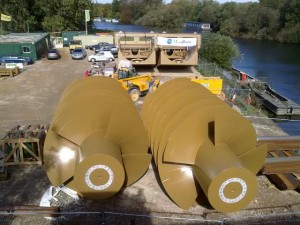-
- Buy a UK rod licence: EA Link
- 0800 807060 EA Hotline, Pollution, Poaching
- Thames Region River Levels
- Thames River Conditions
- Thames Temps and Clarity
- Thames Fishing Byelaws
- Thames Annual Tidefest
- Thames Record List
- Thames Eel Monitoring
- EA Annual Fisheries Report
- EA Flood Warnings
- Thames Sewage Discharge Notifications
- Thames Sewage Events
- Thames Tideway Tunnel
- River Thames Scheme: Reducing flood risk from Datchet to Teddington
- Martin Salter: Fighting for Fishing Blog
- Duncan Charmans World of Angling Blog
- Angling Trust
- Water and sewerage companies in England: environmental performance report 2013 – 2016
- EA Pollution incidents: 2014 evidence summary
- EA Pollution incidents: 2015 evidence summary
- River Crane and DNR Fisheries Impact assessment
- Links
Recent Tweets
Error retrieving tweetsNews Archive
Yet more Hydropower omnishambles as Environment Agency ducks decision to protect our rivers
At a meeting of on Thursday 11 July, the Environment Agency (EA) board failed to approve new Good Practice Guidelines for hydropower developments because of a lack of evidence provided by the EA executive team to support their recommendations that higher flow protection standards should be adopted. The Angling Trust, Fish Legal, Salmon & Trout Association, Atlantic Salmon Trust, Buglife and WWF have today demanded a moratorium on all new developments until the necessary evidence has been gathered to enable a decision to be taken to protect rivers from further damage. This latest delay follows years of broken promises and delays with the process of developing the new guidelines.
The meeting was expected to approve the executives' recommendation to adopt new guidelines which would have reduced the amount of water that could be diverted from rivers into hydropower turbines. The proposed guidelines were supported by angling and fisheries NGOs who have attended more than 20 meetings to help draw them up.
Their position was based on the best available evidence world-wide, including scores of scientific papers and a review of flow requirements commissioned by the Agency itself from a renowned expert in the field. Angling and fisheries NGOs have repeatedly pressed the Environment Agency, from the Chief Executive down, to monitor the 100 or so developments that have been approved to see what impact they have had on fish and other ecology in rivers. However, all these warnings have been ignored and this has led to the situation where the EA Board felt it did not have the information necessary to take a decision to protect the environment.
The executives failed to refer to the considerable body of scientific literature drawn to the Agency's attention by the NGOs throughout the drawn-out review process. The NGOs have now written to EA Chairman Lord Chris Smith who expressed concern at the lack of information made available to the Board and stated that the bottom line must be "what is the best option for the environment". The NGOs have formally called for a moratorium on approving any further hydropower applications until the new guidelines are in place.
Mark Lloyd, Chief Executive of the Angling Trust and Fish Legal, who attended the meeting and gave a presentation on behalf of angling and fisheries organisations, said: "we have repeatedly highlighted the Environment Agency's shambolic handling of the regulation of hydropower in recent years and this latest development confirms that it continues to be a complete farce. No developments should be allowed on our precious rivers, which already suffer from low flows and diffuse pollution, unless they can be proven to be environmentally benign. The Environment Agency cannot go on allowing developers to profit from installing turbines on our rivers without monitoring their impact, especially as these schemes, once established, will be there for generations. The Environment Agency simply must take a precautionary approach and call a halt to developments until they can obtain the necessary information to support their expert judgement that the current guidelines are not fit for purpose and are in need of a radical overhaul."
Paul Knight, CEO of the Salmon & Trout Association, added; "Surely it is logical that if the EA Board does not have sufficient evidence available to ratify the new Good Practice Guidelines, then its staff cannot have the data on which to licence individual hydropower applications, yet these are still being granted at an alarming rate. We appreciate the pressure on the EA to encourage renewable energy schemes. However, low head hydropower will only ever contribute very limited localised benefit, but has the potential to significantly damage river ecosystems by depleting water flows, causing barriers to fish movements and the natural dynamics of rivers, and destroying habitats for fish and aquatic insects, with a knock-on effect to birds and mammals. We look to the EA Board to send out a strong message that the aquatic environment and its dependent species must be protected, not sacrificed for the political perception that hydropower is a 'green' energy source."
To read the joint letter to Lord Smith from The Angling Trust, Fish Legal, Salmon & Trout Association, Atlantic Salmon Trust, Buglife and WWF CLICK HERE.
This entry was posted in News and tagged Angling Trust, Environment Agency, Fish KIll, Hydropower, Pollution, WFD. Bookmark the permalink.


